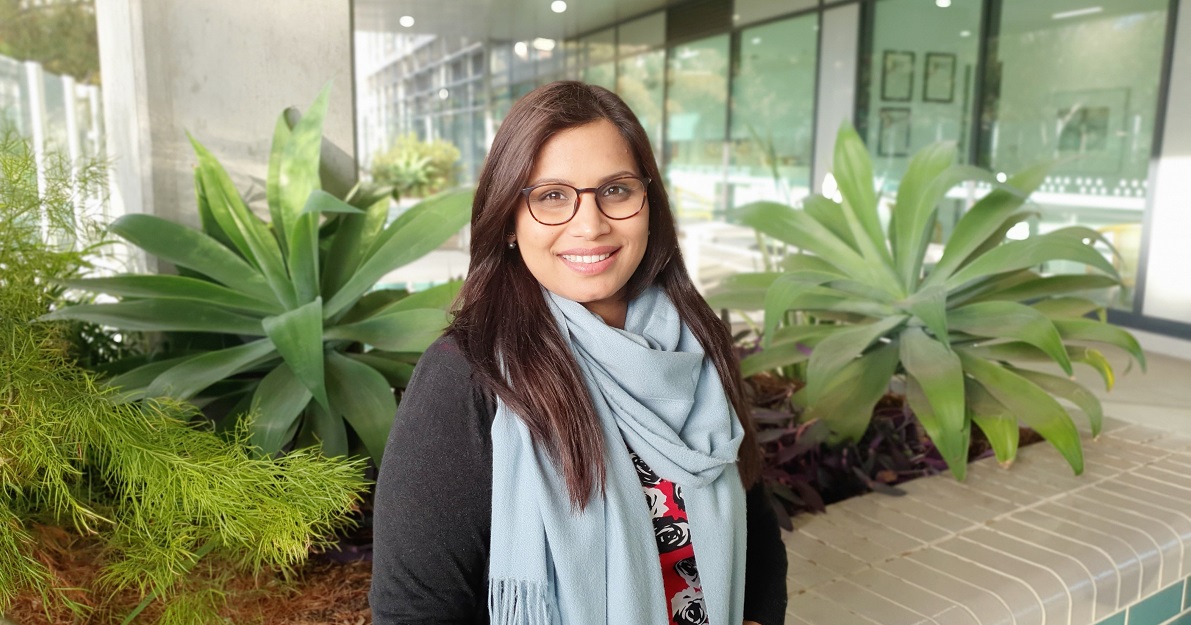
As the next Meet the Minds online lecture presenter, Dr Priyanka Vandersman will explain on July 14 her research into digital innovations for improved end-of-life care. We spoke with her about her remarkable journey from leaving Nepal as a teenager to study nursing and embark on a research career, and how embracing digital technology has also helped keep her connected to her ageing parents in an era of international border closures.
What is your role, and what does your work focus on?
I work as a Research Associate at the Research Centre for Death and Dying (also known as RePaDD) at Flinders. My focus is on ensuring that older Australians receive good quality care at the end of their lives. I’m part of the ELDAC project, a government-funded national project that aims to improve the quality of palliative and end-of-life care provided to older Australians in the aged care sector. My work involves developing and testing technology solutions that could help aged care providers to plan and deliver quality end of life care. While building and testing technology sounds very geeky and dull, the work I do involves many exciting and varied activities. I enjoy connecting and collaborating with the sector, working to understand the needs of care providers, formulating ways of promoting and sharing our work, and even being featured in video shoots.
Can you briefly describe the journey that took you to this point in your career?
I trained as a Registered Nurse and mainly worked in palliative care settings. This really connected with my passion for helping those at the end of their life. I also have a very research-driven mind and a deep interest in exploring ways to improve patient/client’s care outcomes. This passion and curiosity led me to do an Honours degree in 2014, and then I moved straight into doing my PhD in 2015, looking at the role of apps in helping older people better manage their pain in the community.
My honours and PhD years were full of wonderful learning, skill-building and networking experiences that occurred within and outside of my candidature. While doing my PhD in digital health, I also worked in chronic and aged care research, and did extensive work in palliative care clinical trials. Consolidating these skills and experiences relating to care for older people and digital technology led me to work in the aged care digital technology research space.
Can you describe a challenge in your life and how you dealt with it?
Like many others, I’m living with the challenge of family separation due to COVID-19. I moved to Australia from Nepal when I was 19, and my parents and siblings don’t live here. I have a wonderful family from my husband’s side here in Adelaide, and they are a true blessing. However, having my aging and elderly parents in another continent during the pandemic has made me feel the vast distance between us even more strongly. The best way to handle that sense of separation from family has been the use of technology, and my parents have taught themselves to use smart devices so we can do video chats very regularly and keep our sense of family connection alive.
What is something you are most proud of?
The journey of my life in Australia is something I’m very proud of. From being a 19-year-old immigrant with minimal language skills and cultural awareness to becoming a post-doctoral nurse researcher with a strong passion for helping those at the end of life, I’ve found that the struggles and experiences along my journey have helped me grow immensely and be very resilient.
I’m also very proud of my research work, which impacts the quality of care that older Australians receive towards the end of their life. It’s humbling to work with consumers, clinicians and care providers, and leaders of the aged care sector who are so generous in sharing their experiences, knowledge, time and effort in improving the quality of care in the sector.
What does a normal day look like for you?
I am not a morning person AT ALL!! So, my day always starts with a good cup of coffee followed by some love and play with my gorgeous 5-month-old Kelpie: Hela. When I get to work, it’s an interesting mix of meetings, operational activities related to active studies/projects, chatting PhD progress with the centre PhD students, writing reports/manuscripts, and planning future projects. I start my day with a hand-written checklist (I am a big fan of the ‘To-Do’ checklist) of all the tasks/activities for the day and tick off each task as it is completed. My workday ends with reviewing my calendar for the next day and devising a mental plan on how I will allocate time to activities for the following day. When I get home, the evening is generally filled with puppy plays, dinner preps, and some recreational reading.
How do you like to relax or spend your spare time?
I enjoy reading books and listening to classical music. I also really enjoy cooking, so my weekends are filled with inviting and hosting friends and families for meals. I love doing DIY projects, as I’m a bit of a handywoman, and I love building and renovating things. My favourite type of DIY project is furniture refurbishment. I find joy in giving love to things that others may consider to be too old, outdated or rejected.
- You can register for Dr Vandersman’s Meet The Minds virtual lecture at 12.30pm on 14 July via Eventbrite.

